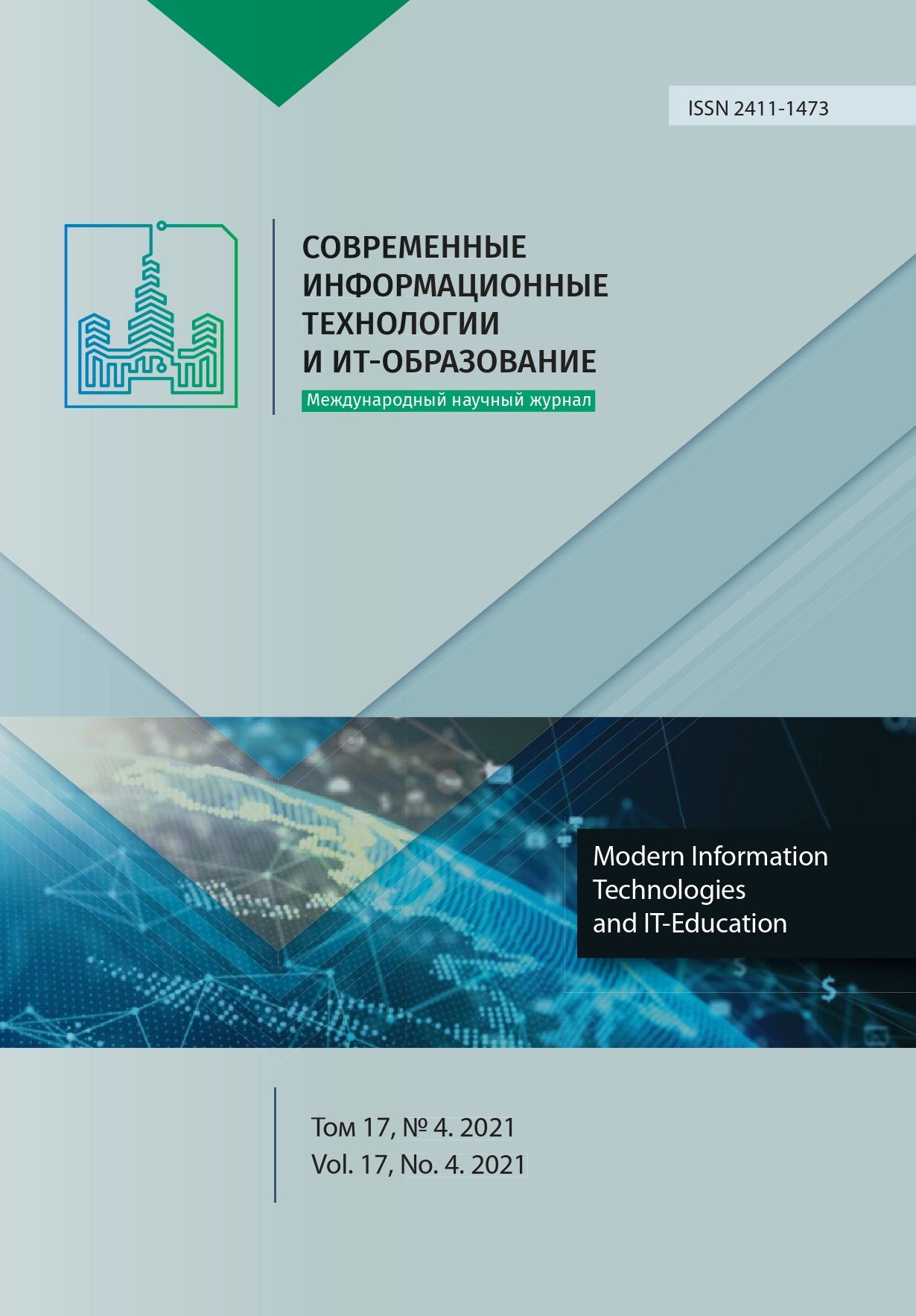Российская научная школа философии информации
современное состояние и перспективы развития
Аннотация
Проведен анализ истории, современного состояния и перспектив развития российской научной школы философии информации. Рассмотрена структура предметной области российских исследований в этой области и показано, что в настоящее время Россия здесь является признанным мировым лидером. Показана концептуальная значимость результатов российской школы в области философии информации для формирования современного научного мировоззрения интеллектуальной элиты, развития фундаментальных и прикладных исследований во многих областях науки, а также для систем образования. Отмечен большой личный вклад в развитие этого направления его основоположника А.Д. Урсула. Определены перспективные направления развития междисциплинарных исследований на основе достижений российской науки в области философии информации.
Литература
2. Ursul A.D. Information, Computer Science, Global Studies. Otkrytoe obrazovanie = Open Education. 2011; (6):64-77. Available at: https://www.elibrary.ru/item.asp?id=17883841 (accessed 10.09.2021). (In Russ., abstract in Eng.)
3. Ursul A.D. Information and Global Processes: The Interdisciplinary Studies. Znanie. Ponimanie. Umenie = Knowledge. Understanding. Skill. 2013; (3):26-33. Available at: https://www.elibrary.ru/item.asp?id=20270084 (accessed 10.09.2021). (In Russ., abstract in Eng.)
4. Ursul A.D. Philosophy of science and conception of sustainable development. Philosophy of Sciences. 2000; (2):1. Available at: https://www.elibrary.ru/item.asp?id=9291473 (accessed 10.09.2021). (In Russ., abstract in Eng.)
5. Kolin K.K. Informatics in the system of advanced education. Vestnik Rossijskogo obshhestva informatiki i vychislitel'noj tehniki. 1996; (3):19-39. Available at: https://elibrary.ru/item.asp?id=26666156 (accessed 10.09.2021). (In Russ., abstract in Eng.)
6. Kolin K.K. Fundamental Problems of Computer Science. Sistemy i sredstva informatiki = Systems and Means of Informatics. 1995; (7):5-20. Available at: https://www.elibrary.ru/item.asp?id=25633840 (accessed 10.09.2021). (In Russ., abstract in Eng.)
7. Kolin K.K. Philosophy of information and philosophical problems of informatics. Alma Mater. Vestnik vysshey shkoly. 2004; (11):33-38. Available at: https://elibrary.ru/item.asp?id=25628240 (accessed 10.09.2021). (In Russ., abstract in Eng.)
8. Kolin K.K. Phenomena of information and scientific paradigm. Science and science of science. 1998; (4):64-67. Available at: https://elibrary.ru/item.asp?id=25645061 (accessed 10.09.2021). (In Russ., abstract in Eng.)
9. Kolin K.K. Informatika kak fundamental'naja nauka [Informatics as a fundamental science]. Informatika i obrazovanie = Informatics and education. 2007; (6):46-55. Available at: https://elibrary.ru/item.asp?id=12844390 (accessed 10.09.2021). (In Russ.)
10. Kolin K.K. Becoming of informatics as fundamental science and the complex scientific problem. Sistemy i sredstva informatiki = Systems and Means of Informatics. 2006; 16(3):7-58. Available at: https://elibrary.ru/item.asp?id=13060515 (accessed 10.09.2021). (In Russ., abstract in Eng.)
11. Kolin K.K. Philosophy of Information and Fundamental Problems of Modern Informatics. tripleC: Communication, Capitalism & Critique. 2011; 9(2):454-459. (In Eng.) doi: https://doi.org/10.31269/triplec.v9i2.298
12. Liu Gang. Philosophy of information and foundations of future Chinese philosophy of science and technique. Voprosy Filosofii. 2007; (5):45-57. Available at: https://elibrary.ru/item.asp?id=9519052 (accessed 10.09.2021). (In Russ., abstract in Eng.)
13. Kolin K.K. Philosophy of information and the problem of modern scientific outlook formation. Herald of the International Academy of Science, Russian Section. 2013; (1):073-076. Available at: https://elibrary.ru/item.asp?id=20307377 (accessed 10.09.2021). (In Russ., abstract in Eng.)
14. Kolin K.K. Topical philosophical and scientific methodological problems of the development of informatics. Metafizika = Metaphysics. 2013; (4):10-34. Available at: https://elibrary.ru/item.asp?id=23279609 (accessed 10.09.2021). (In Russ., abstract in Eng.)
15. Kolin K.K. Philosophy of information: the structure of reality and the phenomenon of information. Metafizika = Metaphysics. 2013; (4):61-84. Available at: https://elibrary.ru/item.asp?id=23279612 (accessed 10.09.2021). (In Russ., abstract in Eng.)
16. Kolin K.K. Philosophical theses about the nature of the information. Herald of the International Academy of Science, Russian Section. 2015; (1):52-58. Available at: https://elibrary.ru/item.asp?id=24373577 (accessed 10.09.2021). (In Russ., abstract in Eng.)
17. Bychkov Yu.M. Ustojchivaja jenergetika dlja vseh ‒ mif ili real'nost'? [Sustainable Energy for All – Myth or Reality?] Energy Bulletin. 2014; (17):44-50. Available at: https://elibrary.ru/item.asp?id=22571468 (accessed 10.09.2021). (In Russ.)
18. Sudakov KV. Informatsionnyĭ printsip v fiziologii: analiz s pozitsiĭ obshcheĭ teorii funktsional'nykh sistem [The information principle in physiology: an analysis from the position of the general theory of functional systems]. Uspekhi fiziologicheskikh nauk. 1995; 26(4):3-27. (In Russ.)
19. Kolin K.J. Information Anthropology: The subject and problems of the new direction in science and education. Bulletin of Kemerovo State University of Culture and Arts. 2011; (17-1):17-32. Available at: https://www.elibrary.ru/item.asp?id=17306359 (accessed 10.09.2021). (In Russ., abstract in Eng.)
20. Sergin V.S. Soznanie kak sistema vnutrennego videniia [Consciousness as a system of inner seeing]. Zhurnal Vysshei Nervnoi Deyatelnosti Imeni I. P. Pavlova. 1994; 44(4-5):627-639. (In Russ.)
21. Kolin K.K. Human and Harmony: information conception of art theory and creation. Prostranstvo i Vremja = Space and Time. 2011; (4):54-63. Available at: https://www.elibrary.ru/item.asp?id=17301426 (accessed 10.09.2021). (In Russ., abstract in Eng.)
22. Kolin K.K. Aesthetics as Informative Science. Strategicheskie prioritety = Strategic Priorities. 2016; (4):72-92. Available at: https://www.elibrary.ru/item.asp?id=28849602 (accessed 10.09.2021). (In Russ., abstract in Eng.)
23. Kolin K.K. Information Anthropology: Next generation and the new threat of psychological stratification of the humanity in the informational society. Herald of the Chelyabinsk State Academy of Culture and Arts. 2011; (4):32-36. Available at: https://www.elibrary.ru/item.asp?id=17273682 (accessed 10.09.2021). (In Russ., abstract in Eng.)
24. Kolin K.K. Problems of information civilization: virtualization of society. Bibliotekovedenie = Library and Information Science (Russia). 2002; (3):48-57. Available at: https://www.elibrary.ru/item.asp?id=32387086 (accessed 10.09.2021). (In Russ., abstract in Eng.)
25. Grinchenko S.N. Metaevolution of the World. Russian Journal of Philosophical Sciences. 2006; (8):111-114. Available at: https://www.elibrary.ru/item.asp?id=9276624 (accessed 10.09.2021). (In Russ., abstract in Eng.)

Это произведение доступно по лицензии Creative Commons «Attribution» («Атрибуция») 4.0 Всемирная.
Редакционная политика журнала основывается на традиционных этических принципах российской научной периодики и строится с учетом этических норм работы редакторов и издателей, закрепленных в Кодексе поведения и руководящих принципах наилучшей практики для редактора журнала (Code of Conduct and Best Practice Guidelines for Journal Editors) и Кодексе поведения для издателя журнала (Code of Conduct for Journal Publishers), разработанных Комитетом по публикационной этике - Committee on Publication Ethics (COPE). В процессе издательской деятельности редколлегия журнала руководствуется международными правилами охраны авторского права, нормами действующего законодательства РФ, международными издательскими стандартами и обязательной ссылке на первоисточник.
Журнал позволяет авторам сохранять авторское право без ограничений. Журнал позволяет авторам сохранить права на публикацию без ограничений.
Издательская политика в области авторского права и архивирования определяются «зеленым цветом» в базе данных SHERPA/RoMEO.
Все статьи распространяются на условиях лицензии Creative Commons «Attribution» («Атрибуция») 4.0 Всемирная, которая позволяет другим использовать, распространять, дополнять эту работу с обязательной ссылкой на оригинальную работу и публикацию в этом журналe.













